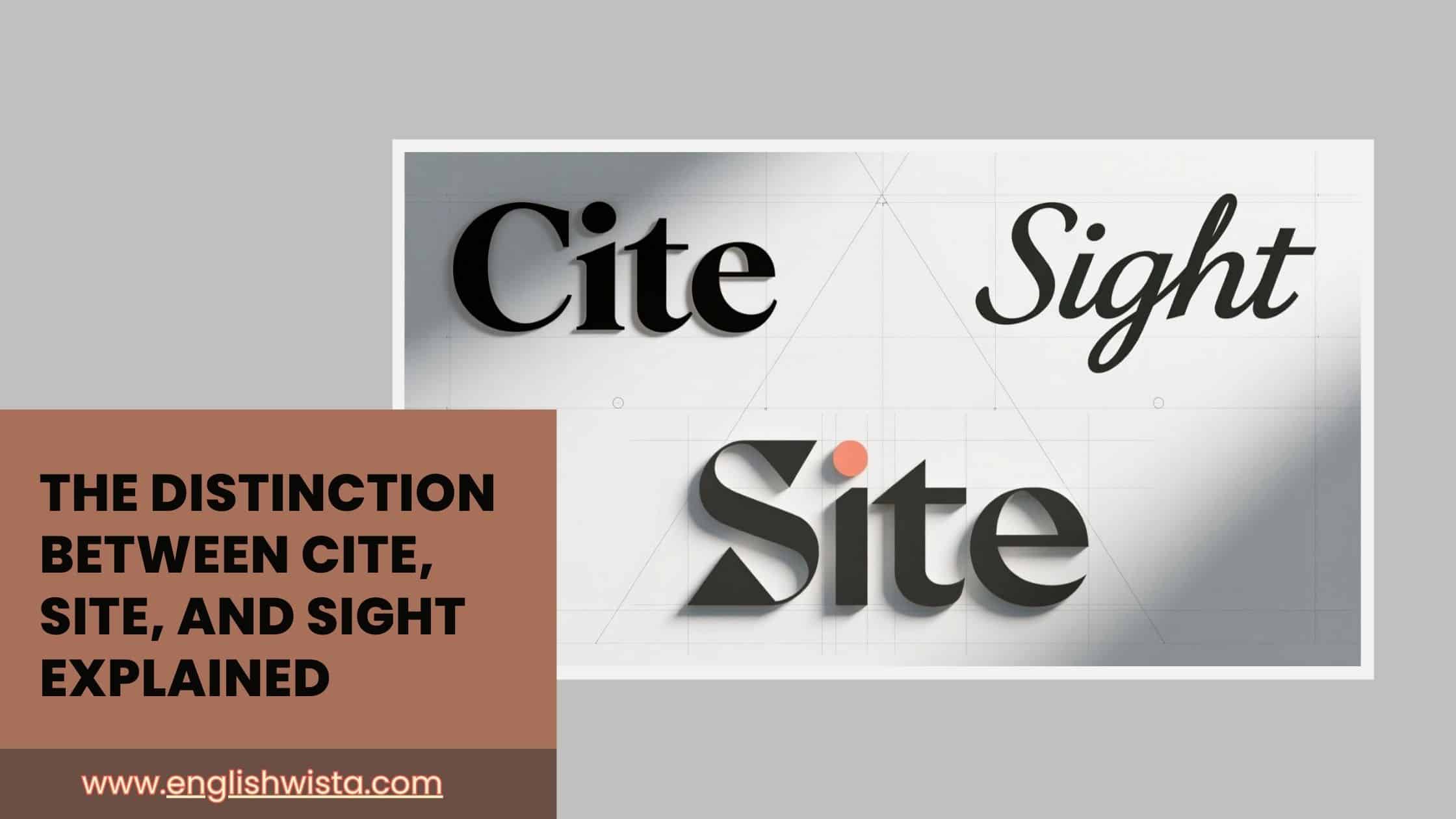Ever feel puzzled when deciding between cite, site, and sight? You’re not alone! These words sound alike but have very different meanings and uses. Don’t worry this guide is here to help. We’ll break things down step by step so you’ll know exactly when to use each word. By the end, you’ll be confident about distinguishing between these tricky homophones.
Let’s dive in and make sense of it all!
What Does “Cite” Mean?
Cite is all about referencing or giving credit. Think of it as pointing to a source of information, a rule, or an example. You might encounter it most often in academic or legal contexts.
Quick Definition:
Cite means to quote, mention, or refer to something as evidence or proof.
Examples in Action:
- “In her paper, Maria cited several scientific studies to support her argument.”
- “Please cite the book where you found that information.”
- “The lawyer cited a previous case to strengthen his point.”
When you’re writing an essay or doing research, citing sources is key to showing where your information came from.
What About “Site”?
Site has to do with locations. It can refer to physical places or online destinations. If you’re visiting a construction site or browsing a website, this is the word you’ll need.
Quick Definition:
Site means a specific place or location, whether physical or digital.
Examples in Action:
- “The company is building a new factory on the construction site.”
- “This park is the site of many historical events.”
- “I found some useful information on that website.”
Here’s a tip: if you can physically stand at the location (or imagine yourself standing there), then “site” is likely the word you’re looking for.
What Does “Sight” Mean?
Sight relates to seeing or vision. It’s all about things you observe with your eyes or imagine seeing.
Quick Definition:
Sight refers to the act of seeing or something that can be seen.
Examples in Action:
- “The sunset over the mountains was a breathtaking sight.”
- “She lost sight of her dog in the crowd.”
- “The tourists were excited to visit all the famous sights in the city.”
Here’s an easy trick: if it’s about vision or appearances, “sight” is the right word.
How to Tell Them Apart
To make things even clearer, let’s summarize the distinctions:
| Word | Meaning | Examples |
|---|---|---|
| Cite | To reference or give credit | “Please cite your sources.” |
| Site | A physical or digital location | “The construction site is busy today.” |
| Sight | Vision or something seen | “The Grand Canyon is an amazing sight.” |
Common Mistakes and How to Avoid Them
- Mixing up “cite” and “site” in writing.
- Wrong: “Can you site your sources?”
- Right: “Can you cite your sources?”
- Using “sight” when you mean “site.”
- Wrong: “I visited the historical sight.”
- Right: “I visited the historical site.”
- Overusing one word because it feels “safe.”
- If you’re unsure, think about the context: Is it about giving credit (cite)? A location (site)? Or seeing something (sight)?
Fun Facts About These Words
- Word Origins:
- Cite comes from the Latin word citare, meaning “to summon or call.”
- Site originates from the Latin situs, meaning “position” or “place.”
- Sight has Old English roots, linked to the word siht, meaning “vision.”
- Homophones:
These three words are homophones, meaning they sound alike but have different meanings and spellings. English is full of them, like there, their, and they’re!
Real-Life Scenarios
Let’s see how these words work in real conversations:
- Academic Setting:
- Professor: “Make sure to cite at least three sources in your essay.”
- Student: “I found some great articles on this site, and I’ll use them!”
- Travel Planning:
- Friend 1: “What’s a good site to visit in Paris?”
- Friend 2: “The Eiffel Tower is an unforgettable sight!”
- Work Context:
- Manager: “We’ll meet at the construction site tomorrow morning.”
- Team Member: “Got it. I’ll also cite the safety regulations during our meeting.”
Quick Tips to Remember
- Cite: Think “citation” (references or quoting).
- Site: Think “location” (physical or digital).
- Sight: Think “vision” (what you see).
Test Yourself!
Try filling in the blanks with the correct word:
- “The scientist had to ___ her research in the presentation.”
- “We went to the historical ___ where the battle took place.”
- “The fireworks display was an incredible ___ to behold.”
(Answers: 1. cite, 2. site, 3. sight)
Conclusion: Easy as 1-2-3!
Now you know the difference between cite, site, and sight! These words might sound the same, but their meanings are worlds apart. Remember: cite is for references, site is for locations, and sight is for seeing.
With a little practice, you’ll master them in no time. The next time these words come up, you’ll be ready to use them confidently and correctly. Keep this guide handy, and feel free to share it with friends who might need a little help too!



